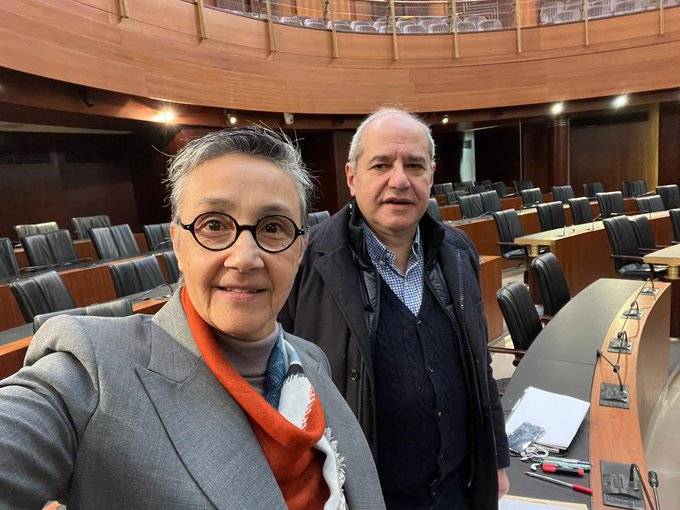Deputy Najat Aoun Saliba announced that she would continue her national interests in her environmental field of expertise outside the parliament, paying tribute to her colleague "in standing and struggle," deputy Melhem Khalaf. In a statement directed to the public, she said: "When I announced, along with my colleague deputy Melhem Khalaf, our decision to remain in the general assembly hall of the parliament starting from January 19, 2023, the aim was, and still is, and will remain, to affirm our belief in the state of institutions as the only reference for our work and our political lives, and to determine our national destiny, as well as to reinforce the necessity of relying solely on constitutional and democratic mechanisms to achieve that, in all fields and domains, including filling the presidential vacancy, after the presidency was left vacant and the parliament refused to fulfill its constitutional duty in this regard."
She continued: "We firmly believed that the internal objective opportunity at that time was favorable to elect a president for the republic, but we discovered that the reality on the ground was entirely different. What did we discover? First, we found that the Speaker of the Parliament was refraining for multiple and intertwined reasons from calling the General Assembly to open sessions to elect the president. He has often abstained from fulfilling that duty due to uncertainty from himself and the parties that support him regarding the results stemming from voting to elect a president in open sessions."
She added: "Secondly, we discovered the absence of will among the deputies to convene to elect a president, and their resignation from bearing their responsibility regarding this matter, without generalization, of course. What was the result? The result was that the parliament, which should be 'its own master,' denied its constitutional duty, surrendering to the will of the vacancy, which the Speaker himself oversees, and who aligns with his position, resigning from his role with prior intent and design, making the sovereign decision exit Lebanon and fall into the hands and interests of outside, regional, and international parties. To the extent that Lebanon has become, with its political decision and the collusion of corruption, arms, and sectarianism, outside history and geography. Lebanon will neither be able to turn East nor West in the presence of a locally rejected authority, isolated regionally and internationally. My colleague Melhem Khalaf and I chose to refuse to participate in this dangerous constitutional violation, but we discovered after 243 days of our stand that it revolves in a vicious circle."
Aoun Saliba pointed out that "we left no effort untried, no door unknocked, and no dialogue uninitiated to break through the wall of this presidential vacancy, but in vain."
She stated that "it has become necessary for me personally to continue my national interests, including those in my environmental field of expertise outside the council. I have established a comprehensive environmental plan, in cooperation and coordination with environmental specialists and international and local organizations and institutions, to implement this plan across all Lebanese territories. I warmly salute my colleague in standing and struggle, Captain Melhem Khalaf, who will continue his stand until an open session is held in successive cycles, and I pledge to stand by him day and night, continuing to coordinate with him, prioritizing the completion of work in the areas of national, social, cultural, and environmental struggle, believing that working on the ground in my areas of expertise, with people and forces of change and active groups in all fields of public service, is what comforts me, strengthens my resilience, and makes me faithful to the values I have committed to and campaigned on the basis of."
She called on "fellow deputies to make the decision that the constitution mandates for the election of a president of the republic and to regularly operate institutions as soon as possible."
Aoun Saliba concluded: "Dear Lebanese, we must not allow the state to die, nor Lebanon."




